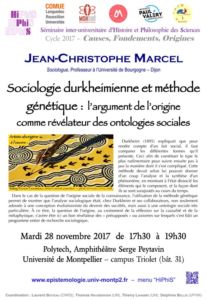HiPhiS Seminar “Durkheimian Sociology and Genetic Method: The Argument of Origin as a Revealer of Social Ontologies”
This event has passed!
Tuesday, November 28, 2017, from 5:30 p.m. to 7:30 p.m.
Polytech, Serge Peytavin lecture hall, building 31, Triolet campus
Free admission
 Inter-university seminar on the History and Philosophy of Science, 2017 cycle: "Causes, Foundations, Origins."
Inter-university seminar on the History and Philosophy of Science, 2017 cycle: "Causes, Foundations, Origins."
Lecture presented by Jean-Christophe Marcel, sociologist, Professor at the University of Burgundy, Dijon.
Summary:
As early as 1895, Durkheim explained in The Rules of Sociological Method that in order to account for a social fact, it is necessary to compare its different forms. This is in order to establish the most rudimentary type and then follow step by step how it became more complex. According to him, this method should provide both an analysis and a synthesis of a phenomenon, showing its constituent elements in their dissociated state and how they have been added to over time. He believed that this field of comparison was better suited to determining the conditions on which the formation and association of the elements of a phenomenon depend.
In the case of the question of the social origin of knowledge of oneself and the world, the use of the genetic method shows that sociological analysis, for Durkheim and his collaborators, was based not only on an evolutionary conception of the development of societies, but also on a very particular social ontology for thinking about society. In this respect, the question of origin, at the crossroads of reflection on causality and metaphysics, proves to be a good indicator of the "presuppositions" or axioms—in the sense of unprovable propositions underlying a theory—on which an entire program of sociological research was built.
More information on HiPsiS conferences
